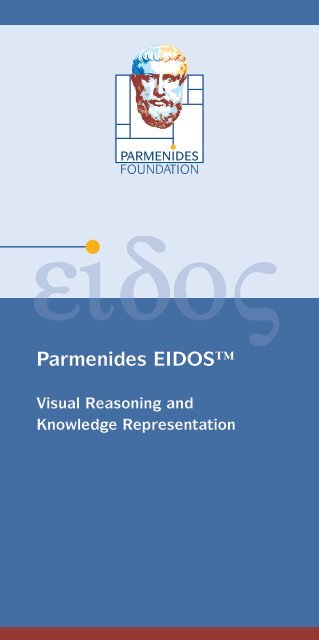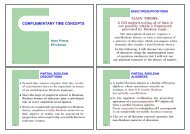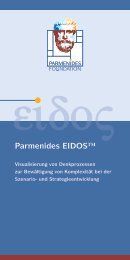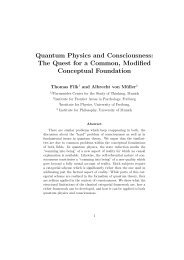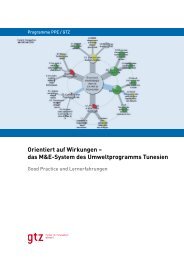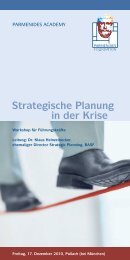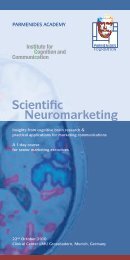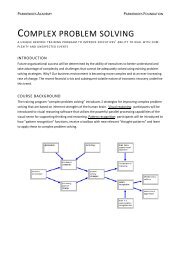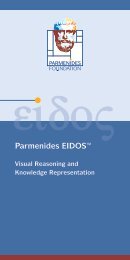Parmenides EIDOS™ - Parmenides Foundation
Parmenides EIDOS™ - Parmenides Foundation
Parmenides EIDOS™ - Parmenides Foundation
You also want an ePaper? Increase the reach of your titles
YUMPU automatically turns print PDFs into web optimized ePapers that Google loves.
<strong>Parmenides</strong> EIDOS<br />
Visual Reasoning and<br />
Knowledge Representation
Complexity and Thinking – the Growing<br />
Gap between Skills and Challenges<br />
Rapidly increasing complexity and an accelerating<br />
pace of structural change constitute qualitatively<br />
new challenges for which human cognition is not well<br />
prepared. The present gap between challenges<br />
and innate cognitive skills has emerged because<br />
cultural evolution outpaced biological evolution by<br />
orders of magnitude. The purpose of the <strong>Parmenides</strong><br />
EIDOS methodology is to help close this<br />
gap. It utilises the powerful parallel processing<br />
capabilities of the visual sense for supporting<br />
thinking and reasoning tasks. People who have to<br />
analyse problems, develop strategies and make<br />
decisions can benefit most from it.<br />
<strong>Parmenides</strong> EIDOS<br />
A visual reasoning language that improves<br />
❚ our ability to deal with complexity,<br />
❚ understand and shape structural change,<br />
❚ capture and communicate the respective<br />
insights.
An Evolutionary Perspective on<br />
the Human Brain<br />
The last major evolutionary transition of the human<br />
brain was the development of syntactical language<br />
skills – about 100 thousand years ago. Most of the<br />
human brain, instead, is still the result of adaptations<br />
to environments and challenges that are<br />
millions of years old. In this setting fast recognition<br />
of complex visual patterns, often highly blurred,<br />
was crucial. Our respective skills are outstanding.<br />
Today we have to understand and shape highly<br />
complex structures and dynamics to which we<br />
often do not even have direct perceptual access.<br />
Representing them via language-based thinking<br />
processes has severe constraints. Both, our working<br />
memory capacities and our actual processing<br />
routines are very limited in this regard.<br />
The task of <strong>Parmenides</strong> EIDOS is to translate the<br />
new challenges in a way that the outstanding<br />
visual processing skills which we do possess can<br />
be used for solving them – hence the idea of a<br />
visual reasoning language.<br />
In a knowledge-based economy thinking becomes<br />
the core value creation process. The ability<br />
of organizations, institutions and societies to<br />
foster outstanding thinking determines their<br />
success.
Supporting Human Thinking Skills<br />
Mankind has been using tools in order to expand<br />
innate capabilities in almost all fields of life – but<br />
hardly ever for the task of thinking as such.<br />
We do possess a broad spectrum of support-tools<br />
for quantifiable tasks. Likewise, there is a plethora<br />
of approaches visualising quantitative relations.<br />
But for the actual, qualitative thinking processes –<br />
i.e. the acts by which we connect existing mental<br />
content in order to gain new insights – there is<br />
hardly any qualified support.<br />
Based on the study of how thinking actually works<br />
and how it is implemented in the human brain,<br />
new approaches to support thinking become<br />
possible. They disaggregate complex - and often<br />
nebulous - tasks into their basic cognitive operations,<br />
visualise those individually, and recompose<br />
them in crisp and transparent<br />
reasoning architectures.<br />
By doing this the ability to deal with complex<br />
issues, both, on an individual base and in groups,<br />
can be significantly improved. At the same time<br />
this methodology allows capture of (systemic)<br />
knowledge instead of only (linear) information.
Storing knowledge as knowledge requires that the<br />
recipient is provided not only with the results of<br />
thinking processes. Instead, he or she should<br />
be enabled to unpack and “re-run” the underlying<br />
thought processes as such. Exactly this kind of<br />
capturing “knowledge as knowledge” is a sideeffect<br />
that results from supporting thinking with a<br />
visual reasoning language.<br />
<strong>Parmenides</strong> EIDOS is an innovative approach<br />
that has been used successfully already both in the<br />
private and public sector to support the thinking<br />
and reasoning processes necessary to solve problems,<br />
define strategies and evaluate scenarios<br />
in environments characterized by high degrees of<br />
complexity, controversy and uncertainty.<br />
<strong>Parmenides</strong> EIDOS – Visual reasoning<br />
and knowledge representation.
A modular and highly flexible<br />
architecture of powerful visual tools for:<br />
❚<br />
❚<br />
❚<br />
❚<br />
❚<br />
Handling / reduction of complexity<br />
Thinking and reasoning<br />
Structuring and analysis<br />
Decision-making<br />
Debate / building alignment<br />
Benefits of <strong>Parmenides</strong> EIDOS<br />
Efficiency of discussions, thinking and reasoning<br />
❚<br />
❚<br />
❚<br />
Identification of tasks and issues<br />
Strategic reasoning process<br />
Implementation and monitoring<br />
Capture and communication of thoughts,<br />
arguments and decision<br />
❚<br />
❚<br />
❚<br />
Learning organization<br />
Institutional knowledge base<br />
Buy-in and roll-out<br />
Quality of reasoning and decision-making<br />
❚<br />
❚<br />
❚<br />
Precision<br />
Originality<br />
Relevance
Users<br />
Large and midsized corporations, governments<br />
and governmental institutions, task-forces, defense<br />
and security institutions, non-profit organizations,<br />
universities as well as scenario and strategy<br />
consultants.<br />
<strong>Parmenides</strong> EIDOS provides an integrated<br />
reasoning platform applicable from board level to<br />
operative staff and from cabinet level to policy<br />
units.<br />
Tasks and applications<br />
Innovation strategies for corporations and countries,<br />
cities and communities | inhouse consulting | strategic<br />
selling and sales controlling | market and business<br />
intelligence | financial controlling and project<br />
management | strategic emphasis | strategy<br />
development and comparison | scenario development<br />
and monitoring | IT strategy development |<br />
risk management and evaluation | security and<br />
application in proactive defence | marketing |<br />
brand development | strategic selling | procurement<br />
strategies | intelligent saving | communication<br />
strategies | Interactive Knowledge Backbone |<br />
context analysis | benchmarking | next neighbor<br />
mapping | evaluation and profile development,<br />
monitoring | innovation-based development |<br />
human resources | country/corporate development |<br />
intelligent donor strategies | competitive strategies |<br />
poverty reduction strategies | impact assessment |<br />
knowledge capturing for donors | good governance,<br />
intergovernmental learning | mediation | crisis<br />
prevention and many other complex and challenging<br />
thinking processes
‘Eidos’ refers in ancient greek to ‘form’ or ‘underlying<br />
concept’. Being derived from the notion ‘eidein’<br />
(seeing) it specifically refers to a capacity that could<br />
be described as ‘seeing with the mind’.<br />
Contact for Private Institutions:<br />
<strong>Parmenides</strong> <strong>Foundation</strong><br />
C.A.T. Center for Applied Thinking GmbH<br />
Kardinal-Faulhaber-Straße 14a<br />
80333 München, Germany<br />
Phone +49 89 210 229 15<br />
eidos@parmenides-foundation.org<br />
Contact for Public Institutions:<br />
<strong>Parmenides</strong> <strong>Foundation</strong><br />
eusg – European School of Governance<br />
Palais am Festungsgraben<br />
Am Festungsgraben 1<br />
10117 Berlin, Germany<br />
Phone +49 (0)30 20 61 62 57<br />
eidos@eusg.de<br />
www.parmenides-foundation.org/eidos/


